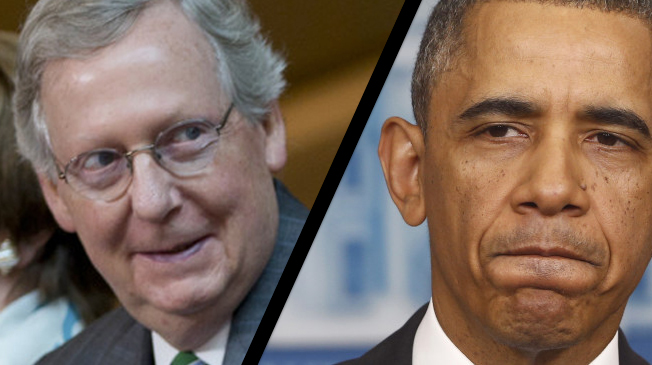It’s a real — albeit tricky — possibility that raises the stakes in the 2014 elections: a Republican-led Senate could prevent Barack Obama from appointing a Supreme Court justice, should one need to be replaced in the final two years of his presidency.
None of the members have announced intentions to retire. But Democratic-appointed Justices Ruth Bader Ginsburg, 81, and Stephen Breyer, 75, are under pressure to step down so that a Democratic president can name their successor. And Republican-appointed Justices Antonin Scalia, 78, and Anthony Kennedy, 77, are close to the average retirement age of 78.7 for a justice.
The prospect of a GOP blockade on another Obama nominee to the Supreme Court was raised by New York magazine columnist Jonathan Chait, who pointed out that his most recent pick, Elena Kagan, received just five Republican votes, three of which have since departed.
“It may seem implausible that Republicans would simply refuse to allow Obama to appoint any justice to such a vacancy. That is only because things that haven’t happened before are hard to imagine,” Chait wrote. “The modern pattern in American politics is that tactics that are legally available, but never used for reasons of custom, eventually become used. The modern pattern is also that the Republican Party, which is the most ideologically cohesive and disciplined party, leads the way.”
Legally, experts say there would be nothing to stop a hypothetical Senate Majority Leader Mitch McConnell (R-KY) from stonewalling an Obama nominee to the Supreme Court in 2015 or 2016 until the next president is sworn in.
“Senate Republicans have been willing to push the bounds of their parliamentary rights in many ways while they’ve been in the minority. And so it’s possible that they might attempt to blockade an Obama 2015 or 2016 nominee if they regained control of the Senate in 2014,” said Sarah Binder, a leading Senate expert and professor at George Washington University.
But that doesn’t necessarily mean they’d do it. The politics of blocking a Supreme Court nominee could be problematic, given the high national profile for the position and inevitable backlash from the left. The more time there is in Obama’s term before a Supreme Court justice needs to be replaced, the harder it would be for Republicans to successfully pursue the strategy.
“I think the political reaction to such a strategy might be sufficient to rein in GOP obstruction,” said Binder. “And keep in mind that Obama could act strategically to select a nominee who might make it politically tough for the GOP to prevent from coming up for a vote. Hard to predict for sure.”
The stakes for replacing any of the sitting justices would be enormous, especially given the court’s 5-4 split on many critical issues. McConnell and his Republican caucus have demonstrated a desire to maintain strong conservative presence in important courts, mounting a blanket GOP filibuster of three Obama nominees to the D.C. Circuit Court of Appeals until Democrats scaled back the blocking tool in November.
But despite the importance of the D.C. Circuit court, it carries a much lower national profile than the Supreme Court. That’s a double-edged sword: while liberals would raise hell about a politically-motivated Supreme Court blockade, conservatives would also aggressively demand that a Republican majority run out the clock on Obama.







I hadn’t considered that possibility and will make it a motivation to somehow get involved in a Senate campaign to help prevent it.
In the situation with a Republican Senate, they would without question run out the clock on President Obama appointing a SC Justice for any vacancies that open up with say a year or less on the term of the Senate. Any longer vacancy than that is really problematic. That would leave the President with some interesting choices:
In a new york minute. They’ll do it even if they don’t win the senate. As long as they have enough votes to filibuster.
I love the idea of bringing back Justice O’Connor, especially if she could be traded for Roberts. But seriously, unless Obama were to nominate a conservative, I don’t see any chance that a GOP senate would confirm anyone.